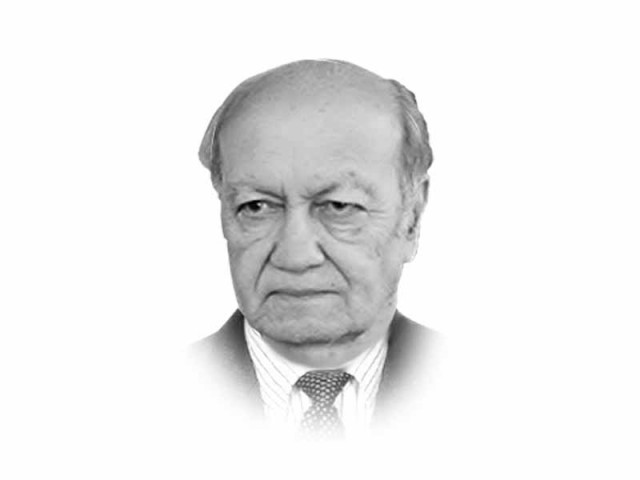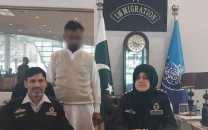Trump’s first odyssey deepens fissures within Muslim world
The US being the dominant power of the region has a crucial role to play

The writer is a retired lieutenant general of the Pakistan Army and a former federal secretary. He has also served as chairman of the Pakistan Ordnance Factories Board
President Trump’s speech was a departure from his past rhetoric. It was essentially balanced, more respectful of the sentiments of Muslim heads of state that were around. However, his comments about Iran were highly derogatory, played to the Saudi hosts, pleased Israel and reinforced the US’s anti-Iran policy. The Iranian regime was accused of interfering in the internal affairs of other countries and spearheading its ideology.
To what extent the visit contributed towards building an aggressive opposition towards Iran will also be of considerable significance. There are indeed deep concerns that Saudi Arabia having formed an alliance of 29 exclusively Sunni states and having the full backing of the US is trying to create a front against Iran. So the question is: will President Trump’s visit act as a catalyst and widen the existing cleavage among the Muslim countries?
The exclusion of Iran and other states such as Iraq and Syria and the unambiguous statement of Prince Mohammad that the Iranian regime has an extremist ideology and a profound desire to dominate the Muslim world and spread its ideology. And his remarks “we will not sit idly by waiting for the battle to take place in Saudi Arabia. On the contrary, we will work so that the battle takes place in their home” had set the tone of the summit.
In these circumstances when Pakistan is a key member of the Saudi alliance and General Raheel Sharif is leading the multi-nation army it is of great interest how the alliance shapes itself. There are clear indications that Iran is viewing our participation with great skepticism, despite repeated assurances that Pakistan will work towards reconciliation and not be a party to sectarian rivalries and regional power plays.
Foreseeing the adverse implications, the country’s parliament had passed a resolution that the government should not be a partisan to the Saudi-led alliance. But considering our strategic and political ties with Saudi Arabia, the PM’s personal relations with the ruling Saudi monarchy and the way decisions are taken in our country, this was not an option. The army leadership being in favour of joining the alliance made things easier for the prime minister. However, the political leadership should have taken parliament and leaders of the Shia community into confidence so that the decision to join the alliance would not be exploited by vested interests.
Muslims need unity now more than ever. Samuel Huntington had propounded his controversial hypothesis about the clash of civilisations and the remaking of the world order. It is an irony that Muslim countries are turning against one another, thus creating a clash from within. Nothing would have pleased Huntington more than what is happening now. It is alleged that Dai’sh was created by major powers in collusion with some Muslim states with the aim of breaking the crescent of Iran-backed countries. As it always happens, it has now come to haunt them.
There is clearly a need to create a joint front against the common menace of terrorism and extremism that faces several Muslim countries. But this requires greater cooperation and coordination in intelligence sharing, training of counter terrorism force and negating the ill affects of ideological indoctrination of militants on vulnerable Muslim youth. There could also be a requirement for raising a small contingent of special forces to assist nations that are facing a direct threat of Da’ish or other Islamist terror groups.
In any case Iran cannot be subjugated. With all its shortcomings the nation is far more united, cohesive than most of the Muslim countries. No doubt it is a theocracy and has a two-tier power structure but gradually they are moving towards democracy. The educational level in Iran is far higher than most of the Middle-Eastern countries. It has been able to counter severe economic sanctions imposed by the West through greater self-reliance, an expanding physical infrastructure and intellectual base. The re-election of President Hasan Rouhani with a convincing majority ensures that Iran would pursue moderate policies at the domestic level and in foreign affairs.
Israel is playing a dangerous game by encouraging the US and Saudi Arabia to weaken or eliminate its adversaries in the Middle East. It is now focused on Iran and apart from the US has found powerful allies among the Sunni countries of the Middle East to challenge its power. This could backfire and set in motion within the Arab and Muslim world forces that could be very divisive.
Moreover, current policies pursued by Saudi Arabia and Iran has resulted in the prosecution of their minorities. Alienation of these communities could lead to their exploitation by vested interests.
We should learn from the European experience as to how after years of bitter rivalry and millions of casualties Roman Catholic and Protestant countries have learnt to live together.
The US being the dominant power of the region has a crucial role to play. Its reliance on Middle East oil resources has considerably reduced still it remains an important resource globally. To maintain its influence, it needs the support of Saudi Arabia and other Middle Eastern countries. Its deep strategic ties with Israel are another compelling factor for continued American involvement in the region.
Muslims certainly do not require armies to fight and destroy themselves. Mideast countries are beset with political, social and economic problems. They need education, political and social development, technology, economic self-reliance and unity at the national and regional levels.
Published in The Express Tribune, May 24th, 2017.
Like Opinion & Editorial on Facebook, follow @ETOpEd on Twitter to receive all updates on all our daily pieces.














COMMENTS
Comments are moderated and generally will be posted if they are on-topic and not abusive.
For more information, please see our Comments FAQ